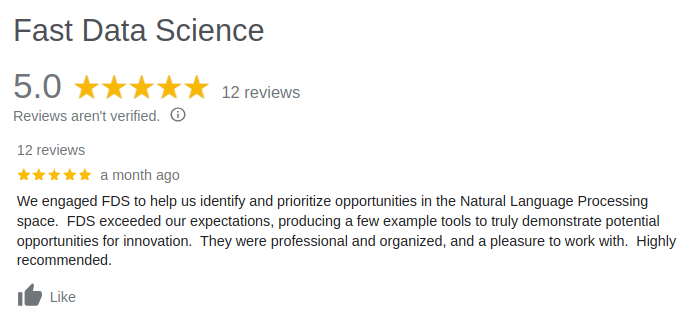
An AI strategy consultant can help your organisation adopt AI technologies to achieve your business goals. Fast Data Science offers AI strategy consulting for public and private sector businesses as well as non-profits. Our AI strategy consultants help our clients to implement AI to improve profitability, customer satisfaction, efficiency, and other measurable metrics.
Your business may be interested in leveraging your in-house data, and need an external partner with AI experience to work with. We can be that partner.
We can take the time to understand your data and your business needs (financial, marketing, customer service, operational, etc), and identify and prioritise opportunities for AI.
We can also develop RFPs for you to seek other AI partners for your broader AI strategy.
Click on any phase above to view its details.
The phases of an AI strategy consulting engagement: data discovery, opportunity identification, opportunity prioritisation, and optional drafting of RFPs
Need AI strategy consulting
An AI strategy consulting engagement typically takes the form of three or four phases:
Data discovery. We explore your dataset and work with staff to understand the data that you are collecting, and identify opportunities where your data could lend itself to AI projects.
Opportunity identification. We organise brainstorming sessions with key stakeholders (e.g. VPs of each division) to identify potential opportunities where AI could be introduced in your business.
Opportunity prioritisation. We investigate the opportunities further to estimate the cost of implementation and benefits of each opportunity, as well as timelines. We work with senior management to prioritise the AI opportunities. The prioritisation is done quantitatively using methods borrowed from market research and social sciences, for example Likert scale surveys to estimate the perceived impact across divisions.
Optionally, we can assist in the development of RFPs for the opportunities identified in Phase 3, which you can put out to public tender. We can assist in the selection of AI partners for the delivery of these key projects.

AI opportunity prioritisation exercise as the beginning of an AI strategy consulting engagement. Projects can be categorised on two axes, difficulty and impact. Attractive initiatives would be towards the bottom right of the graph, that is, having a high impact for low technical difficulty.
Tarion is the regulator for the housing market in Toronto, Canada. Tarion put out a public RFP for an AI partner to assist in the development of an AI strategy, with a focus on Tarion’s large amount of text data, such as homeowners’ forms detailing construction defects in free text. Tarion awarded the contract for this engagement to Fast Data Science and you can read a more detailed summary of the project here.

To kick off the AI strategy consulting engagement, we spent a couple of weeks exploring the data in Tarion’s internal Salesforce database, and delivered a discovery report to the Director of Strategic Initiatives at Tarion. From some sandbox machine learning models, we identified that it was possible to derive predictive value from Tarion’s data, although the data would be easier to work with if a data lake and warehouse were set up as an analytics platform, instead of querying Salesforce directly.
We moved on to hold brainstorming sessions with the VPs of all main departments of the business, including legal, underwriting, IT, and operations. We identified a few key areas where AI would make a huge difference to the business, but managed to collect up to 40 example projects, from predictive analytics, through to simple static data explorations.
To conclude our AI strategy consulting engagement, we conducted a survey of VPs and stakeholders in all departments of the business and asked them to further rank the AI opportunities by stakeholder impact, including impact on homeowners, house builders, staff, and the financial outcome of any initiatives. Independently from the business-centric view of the opportunities, we also ranked them by technical effort, prerequisites, and duration.
The clear winner was a predictive model to triage homeowners’ submissions into those most likely to escalate vs those most likely to resolve. A number of important initiatives emerged, which were mainly predictive models that identify costly or problematic situations before they escalate. Other projects, such as analysis of social media sentiment, although useful, ranked lower in terms of company-wide impact. What is interesting is that without the opportunity prioritisation exercise, it would not have been clear which opportunities would be most beneficial to the business. Opportunity prioritisation allowed us to identify the “low-hanging fruit”, that is, AI initiatives which have a broad impact across the organisation without being too difficult to implement.

Review of Fast Data Science after the AI strategy consulting Tarion project on our Google profile
Fast Data Science, a leader in AI strategy consulting, empowers organizations to unlock the full potential of artificial intelligence through tailored, actionable roadmaps. Our AI strategy consulting services begin with immersive discovery workshops, where our AI strategy consultants collaborate with stakeholders to align AI initiatives with business objectives.
We identify high-ROI opportunities, such as predictive analytics or NLP-driven automation, while addressing risks like data quality or ethical concerns. With a proven track record since 2016, our AI strategy consultants have guided global firms, including those in healthcare and finance, to integrate AI seamlessly. For example, we’ve developed strategies for clients like the NHS to leverage unstructured data for operational efficiency.
Our AI strategy consulting process emphasizes practical implementation, providing clear timelines, cost estimates, and success metrics. By combining technical expertise with business acumen, our AI strategy consultants ensure sustainable, scalable solutions that drive profitability. Led by Thomas Wood, with a Cambridge Masters in NLP, Fast Data Science delivers jargon-free, results-oriented AI strategy consulting, positioning businesses to stay competitive in a rapidly evolving AI landscape while fostering innovation and long-term growth.
Contact us today to get AI strategy consulting!
What we can do for you